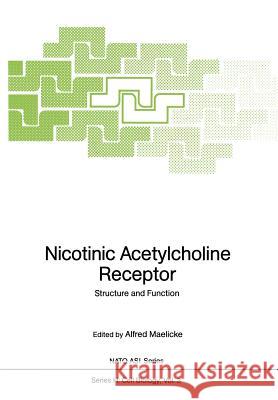Nicotinic Acetylcholine Receptor: Structure and Function » książka
Nicotinic Acetylcholine Receptor: Structure and Function
ISBN-13: 9783642716515 / Angielski / Miękka / 2011 / 492 str.
The most critical event in chemical cell to cell communications is the conversion of the chemical signal into the primary response of the receiving cell. In the case of cholinergic cell to cell communication, i. e. in cholinergic nerve-nerve and nerve- muscle systems, a single molecule, namely the nicotinic acetyl- choline receptor is responsible for both signal reception and primary response: Through binding of the neurotransmitter acetyl- choline released from the associated nerve ending, the receptor receives the chemical message. Short-lived openings of the recep- tor-integral ion channel constitute the initial reaction to this stimulation, i. e. the primary response. This integration of the receiving and the responsive unit into a single protein structure seems to be typical for transmi tter-acti vated ion channel pro- teins of many excitable cells including those of the central ner- vous system. Elucidation of the mechansim of action of the acetylcholine receptor is of interest, therefore, not only for cholinergic cell to cell communications but, even more impor- tantly, as a general model for the less accessible neurotransmit- ter receptors of the central nervous system. While the basic reactions in the, course of cholinergic cell to cell communication and the molecular components involved are rather well understood, a molecular mechanism for cholinergic ex- ci tation has not yet been established.











